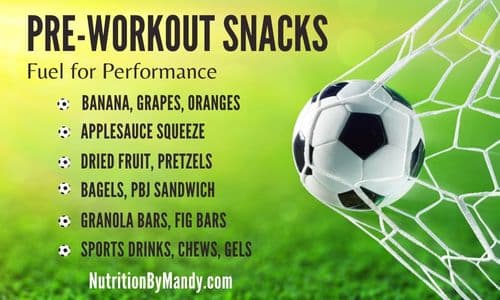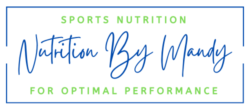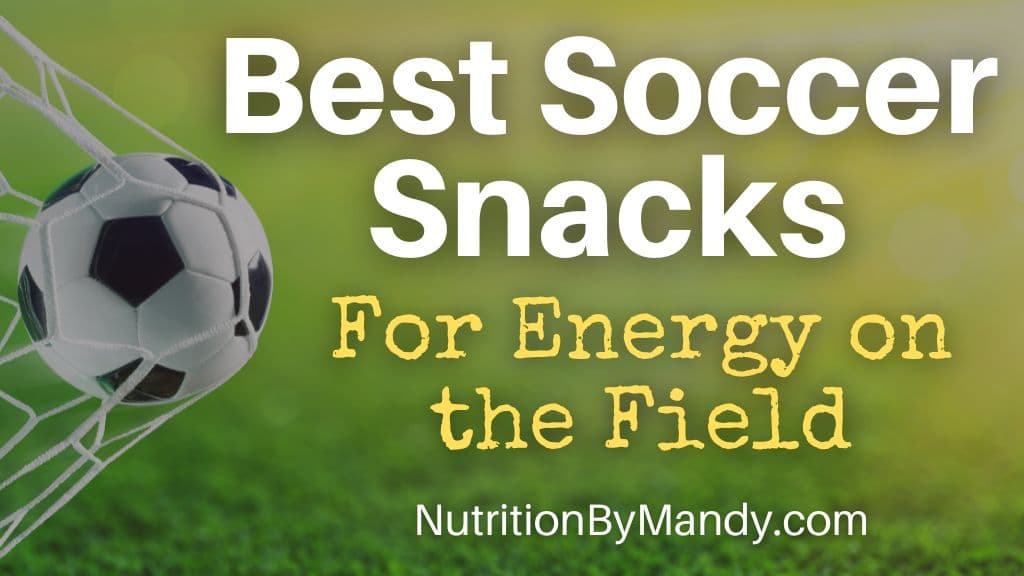Best Soccer Snacks for Energy on the Field
With demanding training and game schedules, it is important for soccer players to have a sports nutrition plan in place to ensure they have the energy needed to perform at their best. Well-planned soccer snacks can provide athletes with a quick source of energy when time is limited.
Let’s take a look at the energy demands of soccer. Then we will explore the best soccer snacks for athletes to eat before, during, and after competition.
Energy Demands of Soccer
Soccer is a high energy demand sport that requires both physical endurance as well as speed.
Depending on position, a soccer player may run between 6-7 miles per game (1). The running is interspersed with sprints and sudden changes in directions requiring quickness and agility.
Having a sports nutrition plan in place is a key component to optimal performance on the field.

Pre-Game Soccer Snacks
Based on the high energy demand of the sport, it is important for soccer players to go into the game well fueled.
Carefully planning pre-game soccer snacks can help ensure that athletes have the energy needed for the upcoming game.
Pre-Game Soccer Snacks: >1 Hour Prior to Competition
Carbohydrates provide the energy the body needs to perform at its best. Therefore, athletes want to focus their pre-game snacks on carbohydrate-rich choices.
When soccer players have a few hours prior to competition, they can eat a larger snack or “mini-meal.” The mini-meal should include items that provide a good source of carbohydrates along with a moderate amount of lean protein.
Example mini-meal soccer snacks include:
- Peanut butter and jelly sandwich with sports drink
- Fruit smoothie
- Turkey wrap with fruit
- Trail mix (made with pretzels, dried fruit, breakfast cereal, nuts) and sports drink
- Breakfast bars with nut butter and a banana
As you get closer to the start of the event, the size of your snack should decrease and your focus should be on consuming carbohydrates for energy.
Eating foods that are high in fat, fiber, and protein too close to the competition may cause GI distress during the activity (2).
Pre-Game Soccer Snacks: < 1 Hour Prior to Competition
When there is less than an hour before the start of the competition, many athletes find it most comfortable to stick with easily to digest, high-carb snacks.
The simple carbohydrates will provide your body with the quick energy needed for competition.
Example soccer snacks include:
- Small piece of fruit
- Applesauce squeeze
- Dried fruit
- Mini bagels, dry cereal
- Low-fat granola bar, fig bar
- Pretzels, pita chips, snack crackers
- Sports drink, chews, or gel

Pre-Game Hydration
Athletes want to start the soccer match in a hydrated state.
Dehydration can negatively impact sports performance and increase the risk of heat illness (2). Thus, focusing on hydration with your pre-game soccer snacks is important.
In regard to pre-event hydration, it is recommended that athletes drink 5-7 mL/kg of body weight of fluid approximately 4 hours prior to the event (3). For most athletes, consuming approximately 2 cups (16 fl oz) of fluid with the pre-game soccer snack can assist you with meeting this goal.
Additionally, consuming foods that contain sodium with the pre-game soccer snack will help your body hold onto the fluid you consume. Salty foods also make you thirsty, which can further assist with meeting your pre-game hydration needs (3).
In the hour leading up to the soccer match continue hydrating. Aim to drink another 4-8 oz of water or a sports drink during this time period.

What About Energy Drinks Prior to Competition?
Athletes may be tempted to grab an energy drink prior to competition thinking it will help them stay fueled throughout the game.
Energy drinks are often marketed with the claims of having a unique “energy blend” to help increase alertness, focus, and boost energy levels, all of which sound appealing to athletes (4, 5).
However, athletes need to be aware that some energy drinks are sold as dietary supplements (6). Dietary supplements are not regulated in the same way that food is by the Food and Drug Administration.
In addition, many energy drinks contain added ingredients that are not necessary prior to competition.
What’s in an Energy Drink?
Energy drinks come in a variety of sizes ranging from large, 16 oz cans, to small shots that are 2-5 oz (6). Energy drinks often contain caffeine along with a proprietary blend of ingredients claiming to increase energy levels.
These energy blends may include ingredients such as: taurine, B Vitamins, guarana, green tea extract, L-carnitine, ginseng, ginger root, and chromium. The exact content of the ingredients contained within the drink may not be listed on the label (6).
The combination of ingredients in the drink may have a synergistic effect in the body and lead to health concerns (4, 5). For the reasons above, athletes should use caution with energy drinks.

Alternatives to Energy Drinks
If you feel you are lacking energy, consider eating a carbohydrate-rich snack, such as a piece of fruit or a granola bar.
In addition, make sure you are getting adequate sleep each night to allow your body time to rest and recover.
Finally, consider meeting with a sports dietitian nutritionist who can create an individualized meal plan to meet your specific sports nutrition needs.
Halftime Soccer Snacks
It is important for soccer players to take advantage of the halftime break to refuel and rehydrate.
Athletes who played substantial minutes during the first-half should place particular focus on halftime nutrition.
Consuming carbohydrates, fluid, and electrolytes during the halftime break can give athletes the energy needed to perform at their best through the end of the game.
Consider the following halftime snack ideas:
- Sports drinks – Provides fluid, electrolytes, and carbohydrates for energy
- Sport chews or gels – Make sure to hydrate with water when you consume chews or gels
- Fresh fruit – Orange slices, banana, grapes
- Applesauce squeeze pouch
- Dried fruit, fruit chews
- Pretzels, pita chips, or snack crackers
- Carbohydrate-based sports bar

What About Sports Drinks During a Soccer Game?
Consuming a sports drink during a soccer game can help athletes replace both fluid and electrolyte losses. In addition, drinking a sports drink that contains carbohydrates will provide soccer players with an extra source of energy during the match (3).
When athletes are competing in a hot and humid environment, a sports drink can be particularly beneficial in helping to replace fluid and electrolyte losses.
Recovery Nutrition for Soccer Players
Recovery nutrition is particularly important when athletes have limited time between events.
Soccer players frequently compete in tournaments where they play multiple matches close together. I encourage athletes to pay particular attention to recovery nutrition when they intend to compete again the same day or the next.
There are three key areas soccer players should focus on when it comes to recovery nutrition.
- Rehydrate: Replace fluid and electrolytes lost in sweat
- Carbohydrates: Refill energy stores used during the activity
- Protein: Build and repair muscles
Recovery Nutrition – Hydration
Following your workout, it is important to replace the fluid and electrolytes lost in sweat.
Weighing yourself before and after a workout can help you determine how much fluid was lost. For each pound of weight lost during the activity, you should aim to drink 20-24 oz of fluid (2).
Consuming sodium, during the recovery period can help your body replace the sodium lost in sweat. In addition, the sodium will help your body better retain the fluid you drink after exercise (3).
Consider adding salty foods such as pretzels, pita chips, deli meat, cheese, pickles, and jerky to your recovery nutrition snacks.
Recovery Nutrition Soccer Snacks
Packing soccer snacks that athletes can enjoy once the game is over can help athletes get an edge on meeting their recovery nutrition needs.
Consider the following post-game soccer snack ideas:
- Low-fat chocolate milk with granola bars
- Peanut butter and jelly sandwich with low-fat milk
- Greek yogurt, berries, and granola
- Sliced cheese, turkey, and whole grain crackers
- Pita chips with hummus
- Sports bar with sports drink
- Post-workout smoothie
Athletes should follow-up their post-game soccer snack with a well-balanced meal in the next couple of hours.
The post-game meal will help to further support the athlete’s recovery nutrition needs.

Practice Your Soccer Snacks
Just as you practice your moves on the soccer field, it is important to practice the soccer snacks you will eat before and during competition. Take time to figure out what foods and beverages work best for you.
Having a well-practiced sports nutrition game plan in place can provide you with confidence that you are fueled to perform at your best.
Best Soccer Snacks for Energy on the Field
You are now set with ideas for planning soccer snacks to provide you with the energy needed to compete at your best. If you are interested in additional sports nutrition tips, check out my blog: 5 Keys to Building the Ideal Athlete Meal Plan.
Join the Nutrition By Mandy Email List & Get a Free Athlete’s Grocery List
Click HERE to join the Nutrition By Mandy e-mail list. When you join you will receive a free athlete’s grocery list to print and take with you to the store.
About the Author
Mandy Tyler is a Sports Dietitian Nutritionist in the San Antonio, TX area. She is a Registered and Licensed Dietitian, a Board-Certified Specialist in Sports Dietetics, a Licensed Athletic Trainer, and is a Certified Exercise Physiologist through the American College of Sports Medicine. Mandy has experience working with athletes at the high school, collegiate, and professional levels. She believes the key to reaching one’s full potential, both in everyday life and in sports performance, relies on a healthy nutritional foundation.

If you are looking to take your performance to the next level, make sure to check out my new Sports Nutrition Game Day Guide. This downloadable guide is written to help athletes develop an individualized plan to achieve peak performance on game day.

